Afrocubanas
Creolizing the Canon
Series Editors: Jane Anna Gordon, Associate Professor of Political
Science and Africana Studies, University of Connecticut, and
Neil Roberts, Associate Professor of Africana Studies and Faculty
Affiliate in Political Science, Williams College
This series, published in partnership with the Caribbean Philosophical Association, revisits canonical theorists in the humanities and social sciences through the lens of creolization. It offers fresh readings of familiar figures and presents the case for the study of formerly excluded ones.
Creolizing Rousseau
Edited by Jane Anna Gordon and Neil Roberts
Hegel, Freud and Fanon
Stefan Bird-Pollan
Theorizing Glissant
Edited by John E. Drabinski and Marisa Parham
Journeys in Caribbean Thought: The Paget Henry Reader
Edited by Jane Anna Gordon, Lewis R. Gordon, Aaron Kamugisha, and Neil Roberts, with Paget Henry
The Philosophical Treatise of William H. Ferris: Selected Readings from The African Abroad or, His Evolution in Western Civilization
Tommy J. Curry
Creolizing Hegel
Edited by Michael Monahan
Frantz Fanon, Psychiatry and Politics
Nigel C. Gibson and Roberto Beneduce
Melancholia Africana: The Indispensable Overcoming of the Black Condition
Nathalie Etoke
Translated by Bill Hamlett
Afrocubanas: History, Thought, and Cultural Practices
Edited by Devyn Spence Benson
Translated by Karina Alma
Edited by Daisy Rubiera Castillo and Ins Mara Martiatu Terry
Afrocubanas
History, Thought, and
Cultural Practices
Edited by
Devyn Spence Benson
Translated by
Karina Alma
Edited by
Daisy Rubiera Castillo and
Ins Mara Martiatu Terry

Published by Rowman & Littlefield International Ltd.
6 Tinworth Street, London, SE11 5AL, UK
www.rowmaninternational.com
Rowman & Littlefield International Ltd. is an affiliate of Rowman & Littlefield
4501 Forbes Boulevard, Suite 200, Lanham, Maryland 20706, USA
With additional offices in Boulder, New York, Toronto (Canada), and Plymouth (UK)
www.rowman.com
Copyright Devyn Spence Benson, 2020
Translation copyright Karina Alma, 2020
All rights reserved . No part of this book may be reproduced in any form or by any electronic or mechanical means, including information storage and retrieval systems, without written permission from the publisher, except by a reviewer who may quote passages in a review.
British Library Cataloguing in Publication Data
A catalogue record for this book is available from the British Library
ISBN: HB 978-1-78661-481-0
Library of Congress Cataloging-in-Publication Data
Library of Congress Control Number: 2020933724
ISBN: 978-1-78661-481-0 (cloth : alk. paper)
ISBN: 978-1-78661-482-7 (electronic)
 The paper used in this publication meets the minimum requirements of American National Standard for Information SciencesPermanence of Paper for Printed Library Materials, ANSI/NISO Z39.48-1992.
The paper used in this publication meets the minimum requirements of American National Standard for Information SciencesPermanence of Paper for Printed Library Materials, ANSI/NISO Z39.48-1992.
To African women, and their Afro-Cuban descendants, for
their arduous struggle for freedom, justice, and equality.
Women who since time immemorial transmitted to us, in
diverse ways, their suffering, needs, achievements, everything
that was given to us and has served as a source of light.
To the Afro-descended women of today who maintain this flag up
high in order to light the way for the generations to come.
To all women, independent of the color of their skin.
Contents
Digna Castaeda Fuertes
Oilda Hevia Lanier
Mara Cristina Hierrezuelo
Mara del Carmen Barcia Zequeira
rsula Coimbra de Valverde
Carmen Piedra
Consuelo Serra
Inocenca Silveira
Gerardo del Valle
Catalina Pozo Gato
Arabella Oa Gmez
Daisy Rubiera Castillo
Yulexis Almeida Junco
Mara Ileana Faguaga Iglesias
Onelia Chaveco Chaveco
Carmen Gonzlez Chacn
Sandra del Valle Casals
Yusim Rodrguez Lpez
Yohamna Depestre Corcho
Yesenia Selier Crespo
Georgina Herrera Crdenas
Ayme Rivera Prez
Lourdes Martnez Echazbal
Coralia de las Mercedes Hernndez Herrera
Leandro Estupin Zaldvar
Ins Mara Martiatu Terry
Ftima de la Caridad Patterson
Isabel Gonzlez Sauto
Edelvis Lpez Zaldvar
Mara Elena Mendiola
Sandra lvarez Ramrez
Lzara Menndez Vsquez
Irene Esther Ruiz Narvez
Yanelys Abreu Babi and Anette Jimnez Marata
Through the following selections in this book, we want to thank especially African women and their Afrocubana descendants for their fight against racism and racial discrimination.
To all the women who contributed their work, who weaved a network of trust and support for us to initiate with this work, a path to banishing forgetting.
To all those who are not in this book, who have guided us well with their good-doing and better way of thinking. To Zuleica for trusting us.
Our gratitude extends not only to women but also to Toms Fernndez Robaina (Tomasito) for facilitating our access to documents that he had saved for future work. We also thank Alberto Abreu and Roberto Zurbano for their support, for listening to us, for their reading of our work, suggestions, and, finally, for their affection and their capacity to encourage us.
To everyone we did not mention, we thank you.
On January 16, 2012, Daisy Rubiera handed me the copy of Afrocubanas: Historia, pensamiento, y practices culturales that she had saved for me from the books release in 2011. In the inscription inside she identified us as colleagues and sisters in the dreams and battles for racial equality. I immediately went back to my apartment in Havana and began to devour the volumes many essays about the history and lived experiences of black women in Cuba. As soon as I read the introduction, I knew that this was a book that was desperately needed in English. My colleagues, students, and family in the United States needed the opportunity to learn about black feminisms in Cuba from black Cuban women themselves . Nearly a decade later, the dream of an English translation of this groundbreaking collection has become a reality thanks to the dedication and hard work of many people and organizations.
I was fortunate to build relationships with the editors and many of the contributors of Afrocubanas in the late 2000s during my residency in Havana for the fieldwork for my first book. I am indebted to Daisy Rubiera, Ins Mara Martiatu Terry (Lalita), Georgina Herrera, Sandra lvarez, and Irene Ester Ruiz Narvez for their intellectual brilliance, persistent commitment to black feminism, and willingness to share their work with me when I was a young graduate student from the United States. Since those early years, we have collaborated on a variety of projects, and I am honored to be able to call such amazing black women my mentors and friends.
This book would not have been possible without the organizational support of the Creolizing the Canon series editors, Jane Anna Gordon and Neil Roberts. I am so grateful to Neil Roberts for initiating this project with a simple email asking if I knew any good books in Spanish that should be translated into English. From that moment forward, it has been rewarding to work with Jane and Neil on this volume. Frankie Mace and Rebecca Anastasi are the best editors at Rowman & Littlefield International, mostly because they accommodated my many extension requests, constant away messages, and because they too believed in the importance of bringing black Cuban womens voices to an English-speaking audience. I am also thankful to the volumes reviewers and cheerleaders who supported this translation from its earliest stages, Odette Casamayor-Cisneros, Alejandro de la Fuente, Tanya Saunders, and Agustn Lao-Montes.

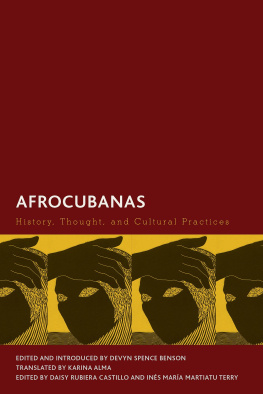
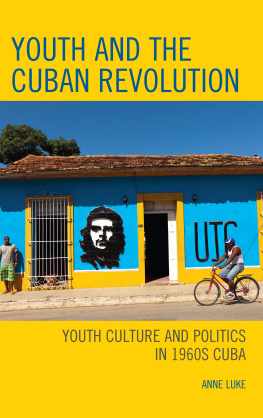
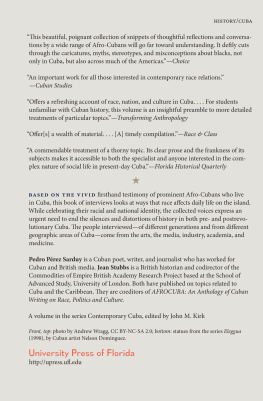

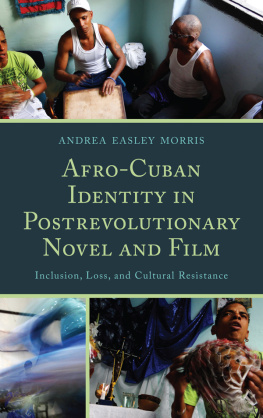
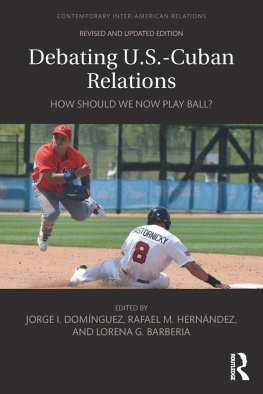
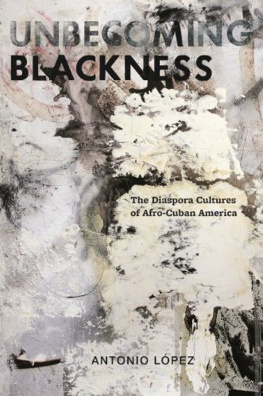
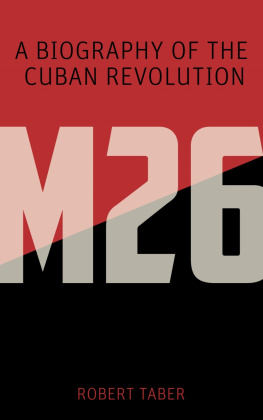

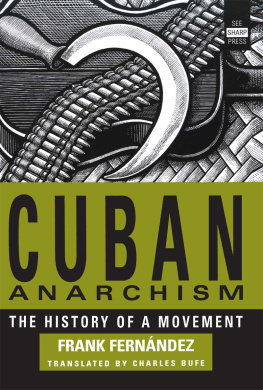



 The paper used in this publication meets the minimum requirements of American National Standard for Information SciencesPermanence of Paper for Printed Library Materials, ANSI/NISO Z39.48-1992.
The paper used in this publication meets the minimum requirements of American National Standard for Information SciencesPermanence of Paper for Printed Library Materials, ANSI/NISO Z39.48-1992.